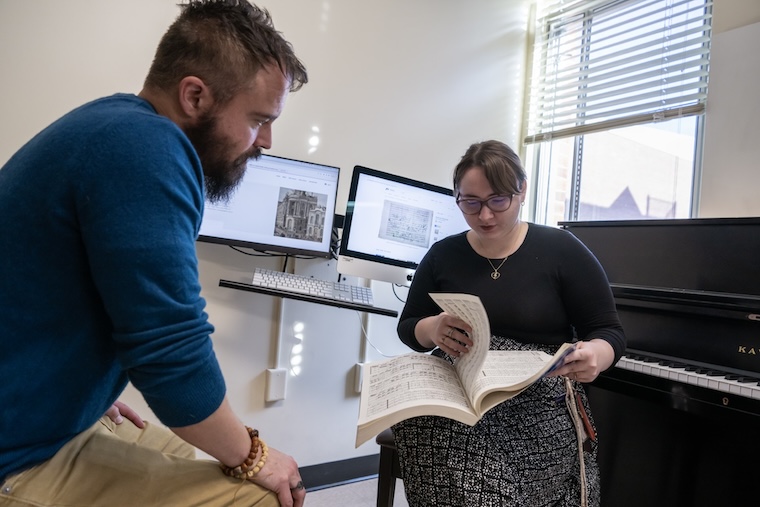Student Helps Professor Update Music Course
Through a summer project funded by a Hodson Collaborative Undergraduate Research Grant, a student worked with her professor to update the Fall ’23 offering of a course she had taken from him.

Kaitlyn McCaffery '24 has long known she wants to be a music teacher. When she came to Washington College and found her place as a music major with a minor in education, she hadn't expected the opportunity to create content for a college-level course as a student.
Following her successful completion of MUS 204: Western Music: Classical to Romantic, a core class for music majors focusing on musical style and individual composers, McCaffery was approached by the course's instructor, Jon McCollum, chair of the music department, who was looking to re-imagine the course and teaching style.
McCollum felt that McCaffery, with her specific interest in music history and music education, would be perfect for a collaborative research project aiming to research and document diverse forms of artistic expression from the classical to the romantic era of music to help reframe the course and its content.
“We were keen to redevelop this course into one that delves more deeply into the cultural contexts for the development of classical and romantic aesthetics,” said McCollum. “The new course does not ignore the typical focus of Western music history (dates, composers, analysis of music scores, etc.), but presents them with a more historical, ethnomusicological approach. Music is far more than notes on a page, or the sound heard in a recording. Music is a product of time and place—of the people and institutions that brought it to life.”
With most students and instructors relying on online programs for course modules and resources, it was important to McCollum and McCaffery to bring a new method of instruction to the class, making it relevant to today's classroom. The resulting online resources created and collected by McCaffery were available to the students who took MUS 204 this fall.
“He proposed me creating a kind of website resource where I could put links to some of the music and [topics] talked about in the books that could dive into more expanded information, or prompt further research in a fun manner…to make the content more interesting, but also to make things more connected and more related to nowadays,” McCaffery recalls. “I think generally in education, that's something we should always look for—making connections to today and how it's relevant and how we can compare what was to what is.”
McCaffery began by reading literature on 18th and 19th century culture and artistic expression, pairing her readings with musical pieces mentioned in the text and existing course materials. Then, she began creating an online platform for students to further explore the course material introduced in lecture and readings, noting that this type of resource is easily adaptable to a professor's teaching style and intent, working as a required resource or a supplemental asset.
Working on this project was enlightening for both student and professor. McCollum spoke of his eagerness to learn from McCaffery's unique perspective as a student.
“A revitalization of MUS 204 had long been a goal of mine and I felt that involving a student like Kaitlyn McCaffery, who has taken the course and plans to teach music, was a wonderful opportunity for both of us to learn from each other,” McCollum said. "Kaitlyn had the opportunity to hone her abilities for assessing the content of both primary and secondary resources, further develop her capabilities for critically analyzing ethnographic situations and the data collected therein, and importantly, gain real-life professional experience."
McCaffery agreed that this project enabled her to gain relevant experience in course planning, useful to her eventual goal of becoming a teacher, and gave her insight into the ever-evolving realm of education and the use of technology in the classroom to engage students.
“It was very interesting having meetings with [McCollum] and seeing this mindset of choosing the books, how [professors] deem content important from the books and what angles they always strive to go for, whereas I would read it and maybe look at something different,” McCaffery said. “It was interesting seeing that teachers are also learning way down the line as well, and that in my profession I'll still be learning down the line, no matter how familiar I am with what I'm doing.”
To this end, McCaffery firmly believes more professors could benefit from similar collaborative efforts, heralding student voices as essential for modernizing courses and engaging students more fully in course material. She encourages professors to take advantage of student opinions.
“Students are always changing, the times are always changing…and what we're focusing on or how we're learning in general is always changing,” McCaffery said. “I think by working with students, [professors] can get a good glimpse into the minds of this generation and how we learn and process information and what makes things more exciting and approachable and gives the best results or outcomes.”
— Emma Poole